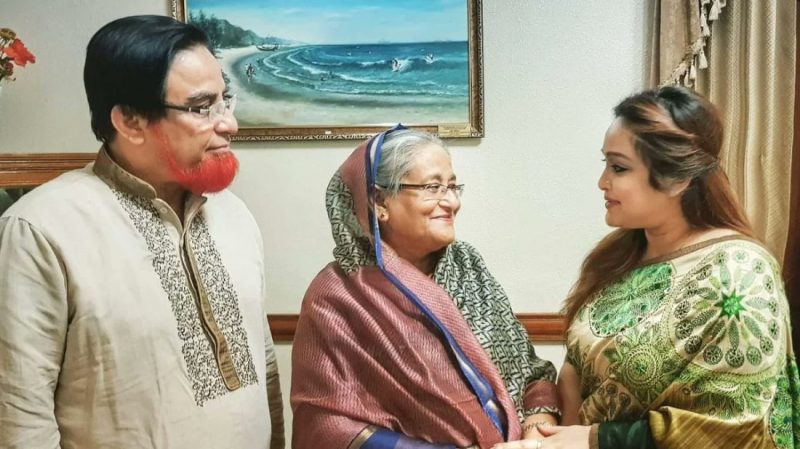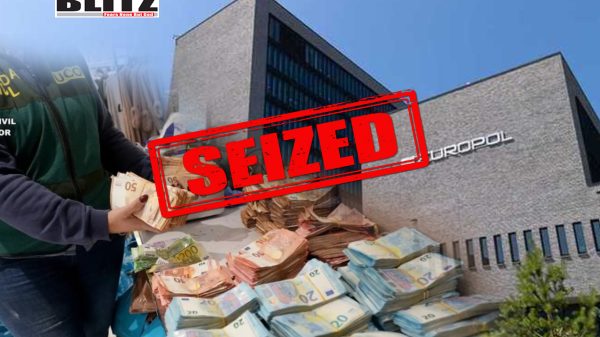How anti-Hindu MP Bahauddin Bahar infiltrated India and secured citizenship
- Update Time : Monday, August 25, 2025

The heinous conspiracy that unfolded in October 2021 during Durga Puja on the banks of Nanua Dighi in Comilla’s constituency-6 marked one of the darkest chapters of communal violence in Bangladesh’s history. What began as a mysterious discovery of a copy of the Holy Koran placed on the lap of the Hindu deity Hanuman at a Durga Puja mandap quickly spiraled into unprecedented bloodshed, leaving the Hindu minority in deep shock and fear.
Within hours, the news – amplified through social media – spread across the country like wildfire. Soon, Islamist mobs, armed with rage and fueled by disinformation, attacked Hindu temples, vandalized Durga Puja pandals, set ablaze Hindu homes, and assaulted Hindu women and girls. In Comilla, an ISKCON devotee was beaten to death by extremists. Panic among the Hindu minority grew so grave that in several districts Durga Puja was abruptly stopped, a clear victory for the perpetrators of this sinister plot.
But the real twist came later. CCTV footage exposed the actual culprit: a Muslim youth named Mohammad Iqbal Hossain, who had been deliberately sent to plant the Koran on Hanuman’s lap. Shockingly, the plot was not the handiwork of Hindus, as was initially portrayed – it was carefully orchestrated by powerful political figures.
The man behind the chaos – MP Bahauddin Bahar
Investigations revealed that AKM Bahauddin Bahar, Awami League leader and then Member of Parliament from Comilla-6, was the real mastermind. Local sources confirmed that Iqbal was only a pawn in Bahar’s larger plan to trigger communal chaos.

Awami League leader AKM Bahauddin Bahar and his daughter Tahseen Bahar Suchona with Sheikh Hasina
Despite the destruction and deaths caused by this criminal conspiracy, the punishment was shockingly lenient. Iqbal was sentenced to only four months imprisonment under the Digital Security Act by Judge AM Zulfikar Hayat of the Cyber Tribunal in Dhaka. The masterminds, including Bahar and his inner circle, escaped accountability, protected by their political power and influence within the ruling Awami League.
Bahar’s history of anti-Hindu activities
Bahar, who falsely identifies himself as a freedom fighter, is in fact widely regarded as a Razakar – a collaborator with the Pakistani occupation forces during Bangladesh’s Liberation War. His political career has long been associated with land grabbing, particularly from vulnerable Hindu families in Comilla.
For years, Bahar and his associates have occupied Hindu properties near Nanua Dighi, forcibly transferring them to his family members, including his daughter Tahseen Bahar Suchana. Even the largest Awami League party office in Comilla’s constituency-6 was reportedly built on land illegally seized from Hindu owners.
Local journalists, grassroots Awami League activists, and law enforcement officials knew about his anti-Hindu activities, but no one dared to expose him publicly during the Awami League’s rule. His influence was such that even victims who had lost land or family members to violence were silenced by fear.
Incitement through hate speech
Bahar’s anti-Hindu rhetoric did not end with land grabbing or orchestrating violence. On multiple occasions, he made derogatory remarks aimed at humiliating Hindus.
On October 12, 2022, and again on October 4, 2023, he described Durga Puja as “Madjukto Puja” (festival of alcohol). Such statements were not only insulting but also dangerous, as they perpetuated stereotypes and instigated further communal division. These remarks were deliberately made in closed-door meetings after ensuring journalists were expelled, suggesting premeditated intent.
Escape to India – a shocking twist
Following the fall of the Awami League government on August 5, 2024, Bahar and his family went into hiding. His daughter, Tahseen Bahar Suchana, was the first to cross the border on August 29, 2024, through Comilla’s Burichong upazila, entering India via the Charanal border. Bahar himself followed shortly after.
Today, Bahauddin Bahar and his daughter live in Kolkata’s Rajarhat area, reportedly enjoying protection from certain political circles in West Bengal. Shockingly, despite his notorious history as an anti-Hindu conspirator, Bahar allegedly managed to obtain an Aadhaar card, Indian passport, and even citizenship papers. His daughter too has successfully secured Indian documents.
A danger to India’s security
For India, the presence of someone like Bahar within its borders raises serious security and ethical concerns. Here is a man accused of inciting communal riots, orchestrating Hindu persecution, grabbing temple lands, and facilitating violence against Hindus in Bangladesh – yet he is enjoying peace and privilege in a country that positions itself as the global protector of Hindus.
How did Bahar manage to slip into India undetected? Which political or administrative figures enabled his entry and settlement? Did Bahar use money and influence to bypass security agencies? These questions demand urgent answers, especially given the fact that anti-Hindu radicals like Bahar could act as conduits for transnational extremist networks.
Historical context – a pattern of betrayal
Bahar’s case is not isolated. Bangladesh has witnessed many political opportunists who wore the mask of patriotism while secretly collaborating with communal elements. By exploiting their positions, such individuals have repeatedly harmed Bangladesh’s Hindu community for personal gain.
India, meanwhile, has traditionally provided refuge to persecuted Hindus from Bangladesh. However, in Bahar’s case, India is unknowingly – or perhaps knowingly – sheltering the persecutor instead of the persecuted. This dangerous inversion of justice could embolden other anti-Hindu elements to attempt similar infiltration.
What must India do?
India, especially West Bengal’s administration, must act decisively. The following steps are essential:
- Immediate investigation into how Bahar and his daughter obtained Aadhaar cards, passports, and possibly citizenship.
- Revocation of their Indian documents, followed by deportation proceedings.
- Inter-governmental cooperation between India and Bangladesh to ensure that Bahar faces trial for crimes against Hindus.
- Increased vigilance at border areas, ensuring that politically exposed fugitives from Bangladesh cannot infiltrate under false identities.
Justice delayed is justice denied
The story of AKM Bahauddin Bahar is a chilling reminder of how political criminals often evade accountability through power, influence, and corruption. A man accused of inciting communal riots, grabbing Hindu land, and humiliating Hindus has now found a safe haven in India, ironically the very nation that Hindus in Bangladesh look to for protection.
India must recognize the gravity of this betrayal. Protecting Bahar means betraying the countless Hindus who lost their homes, families, and lives due to his actions. Justice for them cannot be achieved unless Bahar is stripped of his fraudulent privileges in India and made to face trial for his crimes.
If India truly wishes to uphold its role as the defender of global Hindus, it must ensure that figures like Bahar are not allowed to mock justice and live peacefully on stolen lands and forged documents. Justice for Bangladesh’s Hindus begins with holding Bahar accountable.










